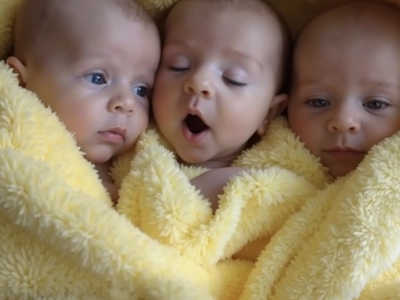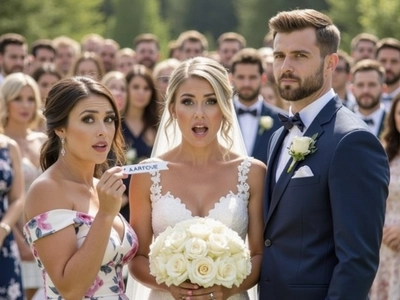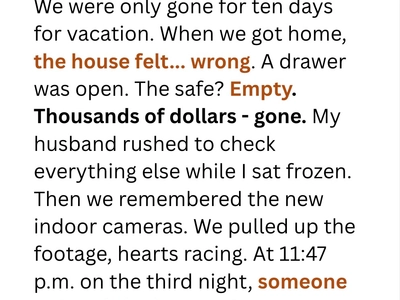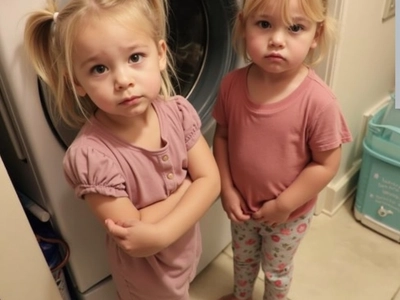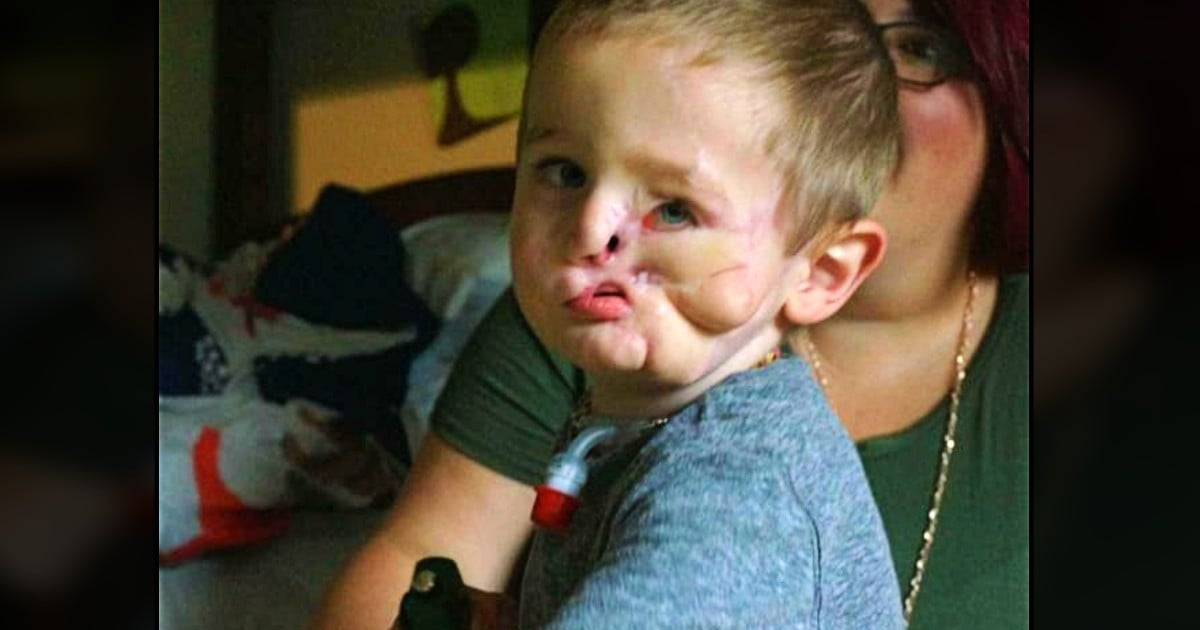He Left Me in the Hospital with Triplets — 12 Years Later, Life Brought Him Back
When I was twenty-three, my life split cleanly into two parts: before Adam left, and after. It happened only a few hours after our triplets were born. There was no shouting, no slammed doors, not even a real goodbye. Just the sound of the hospital door clicking shut, and then silence—except for the cries of three tiny, hungry lives and the pounding in my chest.
“I just need some air, Allison,” he said.
That was the last thing I ever heard from him. That “minute” of air turned into forever.
He took the car. I remember sitting there in the hospital bed, still weak and stitched, staring at the spot where he’d stood. The nurses looked at me with the kind of sympathy that feels like a blanket that can’t reach your toes. They helped me pack, buckled three car seats into a taxi, and wished me luck with tears in their eyes.
I went home to a house that suddenly felt enormous and too quiet, yet somehow never silent. The rooms echoed with cries—three at once, sometimes staggered, sometimes harmonizing in perfect misery. I remember feeding one baby while another screamed and the third kicked his blanket off. I remember crying too, not from pain, but from the weight of everything that had just changed.
Those first weeks were nothing short of survival. I measured my life in ounces of milk, diaper changes, and stolen minutes of sleep. Every sound was either a baby or me sobbing softly into a towel so I wouldn’t wake them. I learned to hold a bottle with one hand while burping another baby and gently rocking the third with my foot. I didn’t feel like a mother; I felt like a factory.
And then one night, around two in the morning, my hands were shaking so badly I couldn’t open a bottle. I stared at the three tiny faces—my children—and felt something inside me crack. Without even thinking, I picked up the phone and called Greg, one of Adam’s old friends. I didn’t know why. Maybe I thought he’d know where Adam was. Maybe I just needed someone who’d remember I existed.
He answered on the second ring. I could barely speak.
“I—I need help,” I whispered.
He didn’t ask questions. Half an hour later, he was standing at my front door with bags of groceries, diapers, and a kind of calm that wrapped around the chaos like a shield.
“Go shower,” he said gently. “I’ve got this.”
And somehow, he did.
From that night on, Greg kept showing up. Not every day at first, but often enough that the babies began to know his voice. He didn’t make promises, didn’t try to play hero. He just helped. He learned how to warm bottles to the perfect temperature, how to burp two babies at once, and how to make silly faces that actually got them to stop crying.
When I finally started sleeping again—really sleeping—he was there. When one baby had a fever at midnight, he drove us to the clinic without hesitation. He showed up when my fridge was empty, when my car broke down, when the twins started crawling in opposite directions.
He became part of the noise, the laughter, the rhythm.
By the time the kids turned four, they were calling him “Dad.” I didn’t correct them. He never asked me to explain it. The name just fit.
We got married in our backyard under string lights, with the smell of cut grass and the sound of our toddlers clapping, their little hands covered in cake. I wore a simple white dress that I’d found on sale, and Greg couldn’t stop grinning. When we kissed, it wasn’t like a fairy tale—it was steady, solid, the kind of love that builds itself piece by piece.
Life slowly began to feel like music again. Not perfect, but full of rhythm. I went back to school, finished my degree, and started working at a family law firm. The house that once felt too big was now bursting with drawings, toys, and bedtime stories. Greg would tuck the kids in every night, even after long workdays, and I’d watch him with this quiet, grateful ache in my chest.
For twelve years, that was our life. Messy. Loud. Beautiful.
Then, one rainy afternoon, everything shifted again.
I stopped at a small coffee shop downtown after court—half to escape the rain, half to catch my breath. I ordered my drink, turned, and froze.
Adam was sitting at a corner table.
He looked older, thinner, like time had stripped away everything that once made him magnetic. His eyes, once bright with plans and charm, were now dull and haunted.
“Allison,” he said softly, standing up. “Hey.”
For a second, I couldn’t speak. My hands felt cold around the coffee cup.
“What are you doing here?” I managed.
He smiled, but it didn’t reach his eyes. “I need your help. Just five thousand dollars.”
I laughed—more out of disbelief than humor. “You disappear for twelve years and show up asking for money?”
His voice dropped. “If you don’t pay… I’ll tell everyone what really happened that night.”
For a moment, I couldn’t breathe. Not because I was scared of what he might say, but because I couldn’t believe he was still trying to hurt me after all this time. There was nothing to hide. He was the one who walked away.
I didn’t even finish my coffee. I went home, told Greg everything, and handed him the crumpled note Adam had slipped across the table. Greg’s jaw tightened, but his voice stayed calm. “We’ll take it to the police,” he said.
And that’s exactly what we did.
When they brought Adam in for questioning, he tried to twist the story—said Greg and I had been together before he left, that the babies weren’t his. He acted like I’d somehow tricked him, like abandoning your family could be justified if the truth was ugly enough.
Greg just looked at him, steady and unflinching. “You left her in a hospital bed with three newborns,” he said. “Don’t call that love.”
The room went quiet. The police took our statements, and I remember walking out into the cold air feeling lighter than I had in years.
We didn’t tell the kids right away. They were almost teenagers—Amara painting galaxies on her bedroom walls, Andy shooting up in height like he was racing the world, and Ashton pushing every rule but always being the first to hug me when I looked tired. They didn’t need to know about Adam’s return, not yet. They knew one thing for sure: their real dad was the one who stayed.
Sometimes, I catch Greg watching them from across the room. There’s this look on his face—half pride, half disbelief. He never asked for any of this, yet he built a family out of someone else’s wreckage.
A few months after Adam’s brief reappearance, life returned to its rhythm. He vanished again, this time for good. The police said he left town before his hearing. I didn’t chase the story. I had three reasons not to look back.
Life, as it turned out, wasn’t a tragedy—it was a transformation. The day Adam walked out of that hospital, he left a space behind, and Greg filled it with something real. Love, I learned, isn’t about grand gestures or perfect timing. It’s about showing up.
In our house, love looks like a man quietly fixing a broken chair at midnight. It sounds like laughter echoing down the hallway, the kind that only families built from chaos can make. It smells like pancakes on Sunday mornings and wet socks by the door.
It’s not the fairy tale I once imagined, but it’s better—because it’s true.
Sometimes people ask me if I ever forgave Adam. I think forgiveness is a strange thing. It’s not a gift you hand to someone—it’s something you do for yourself. The moment I stopped replaying that hospital door closing, I forgave him without needing to say the words.
He gave me pain, yes. But that pain shaped me into someone who could recognize real love when it finally stood at my door with diapers and groceries.
Fate gave me triplets. Choice gave them a father.
And now, when the past comes knocking, I don’t open the door. I don’t need to. I already know who I am.
Every night, when I turn off the lights and listen to the quiet—just the hum of the fridge and the soft breathing of the people I love—I think back to that hospital room. I remember how small I felt, how terrified, how utterly alone.
And then I think about how far we’ve come.
Because love didn’t just find me again—it built a home around me, one feeding, one laugh, one quiet act of kindness at a time.
That’s what life taught me: sometimes the worst day of your life is just the first page of something better.
